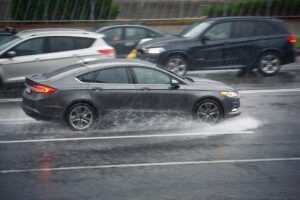
When a car accident claim exceeds insurance limits, what happens depends on who is at fault and the extent of your injuries. In Florida, you usually have to exhaust your personal injury protection (PIP) coverage because it is a no-fault state.
If you suffered serious injuries, you may qualify to file a personal injury lawsuit against the at-fault driver. This allows you to seek additional damages, such as pain and suffering and other non-economic awards.
A Fort Lauderdale car accident lawyer can review your insurance policy, file a claim, and help you take legal action to seek fair compensation.
What Are Insurance Policy Limits in Florida?
In Florida, insurance policy limits refer to the maximum amount an insurer will pay for a claim under a specific type of coverage. Drivers in Florida are required to carry a minimum level of coverage:
- Personal Injury Protection (PIP): Minimum of $10,000 in coverage to pay for your own medical expenses and lost wages, regardless of fault.
- Property Damage Liability (PD): Minimum of $10,000 to cover damage to another person’s property (e.g., their vehicle).
Florida does not require drivers to carry Bodily Injury Liability (BIL) insurance, which would cover injuries to others if the policyholder causes an accident. Many drivers choose not to purchase BIL coverage, leaving accident victims with limited compensation options.
If the at-fault driver has insufficient or no insurance, and your damages exceed the limits of their policy, you may need to turn to other sources of compensation. A Fort Lauderdale personal injury lawyer can help you file a PIP claim and explore other options for seeking compensation.
More people choose The Schiller Kessler Group because they know that we’re a cut above other personal injury law firms.

What Is Personal Injury Protection (PIP) in Florida?
Florida law requires all drivers to carry PIP coverage as part of the state’s no–fault insurance system. PIP covers:
- Medical expenses: Up to 80% of necessary medical costs.
- Lost wages: Up to 60% of lost income if you are unable to work.
- Death benefits: Up to $5,000 if the accident results in a fatality.
PIP coverage is limited to $10,000 per person and is used regardless of who caused the accident. However, in cases of severe injuries, PIP benefits are often insufficient to cover the full extent of your damages.
What If the At-Fault Driver Is Uninsured or Underinsured in Florida?
In Florida, many drivers carry only the legally required minimum insurance—or no insurance at all. If the at-fault driver lacks sufficient insurance to cover your damages, here are your options:
Uninsured/Underinsured Motorist (UM/UIM) Coverage:
Suppose you have UM/UIM coverage as part of your own policy. In that case, it can help cover medical expenses, lost wages, and non-economic damages when the at-fault driver’s policy is insufficient or nonexistent. While UM/UIM coverage is not required in Florida, it is highly recommended because it provides a safety net in these situations.
Filing a Lawsuit Against the At-Fault Driver
You may pursue a personal injury lawsuit to recover damages beyond the at-fault driver’s policy limits. However, if the at-fault driver has little to no assets, collecting compensation may be challenging.
What Damages Can You Seek When PIP Is Exhausted?
If your injuries meet Florida’s serious injury threshold, you can step outside the no-fault system and file a claim against the at-fault driver. Under Florida law, a serious injury is defined as:
- Permanent injury within a reasonable degree of medical probability
- Significant and permanent loss of an important bodily function
- Significant and permanent scarring or disfigurement
- Death
Once you meet this threshold, you may seek additional damages, including:
- Medical expenses (past and future)
- Lost wages and loss of earning capacity
- Property damage
- Pain and suffering
- Emotional distress
- Loss of enjoyment of life
What Happens If the At-Fault Driver Has No Assets?
Filing a lawsuit against an at-fault driver with no significant assets may not be a practical solution. Even if you win a judgment, the driver may not have the resources to pay. In such cases, you may need to:
- Turn to your UM/UIM coverage if available.
- Negotiate a settlement for a smaller, lump-sum payment.
- Explore other liable parties, such as the at-fault driver’s employer (if they were driving a company vehicle) or a vehicle manufacturer if a defect contributed to the accident.
How Does Comparative Negligence Work in Florida?
Florida follows a modified comparative negligence rule, which means your compensation may be reduced if you are partially at fault for the accident.
- If you are found 50% or less at fault, you can recover damages, but your percentage of fault will reduce your award.
- If you are more than 50% at fault, you cannot recover any damages under Florida law.
For example, if your total damages are $100,000 and you are found 20% at fault, your compensation will be reduced to $80,000.
Learn More About What Happens When a Car Accident Claim Exceeds Insurance Limits
When a car accident claim exceeds insurance limits, you may have the right to hold the at-fault driver accountable. At The Schiller Kessler Group, our Fort Lauderdale car accident will explore all available options to ensure you receive the compensation you need to move forward.
To discuss your case, contact The Schiller Kessler Group for a free consultation.
Injured? Call The Aggressive Attorneys Today





